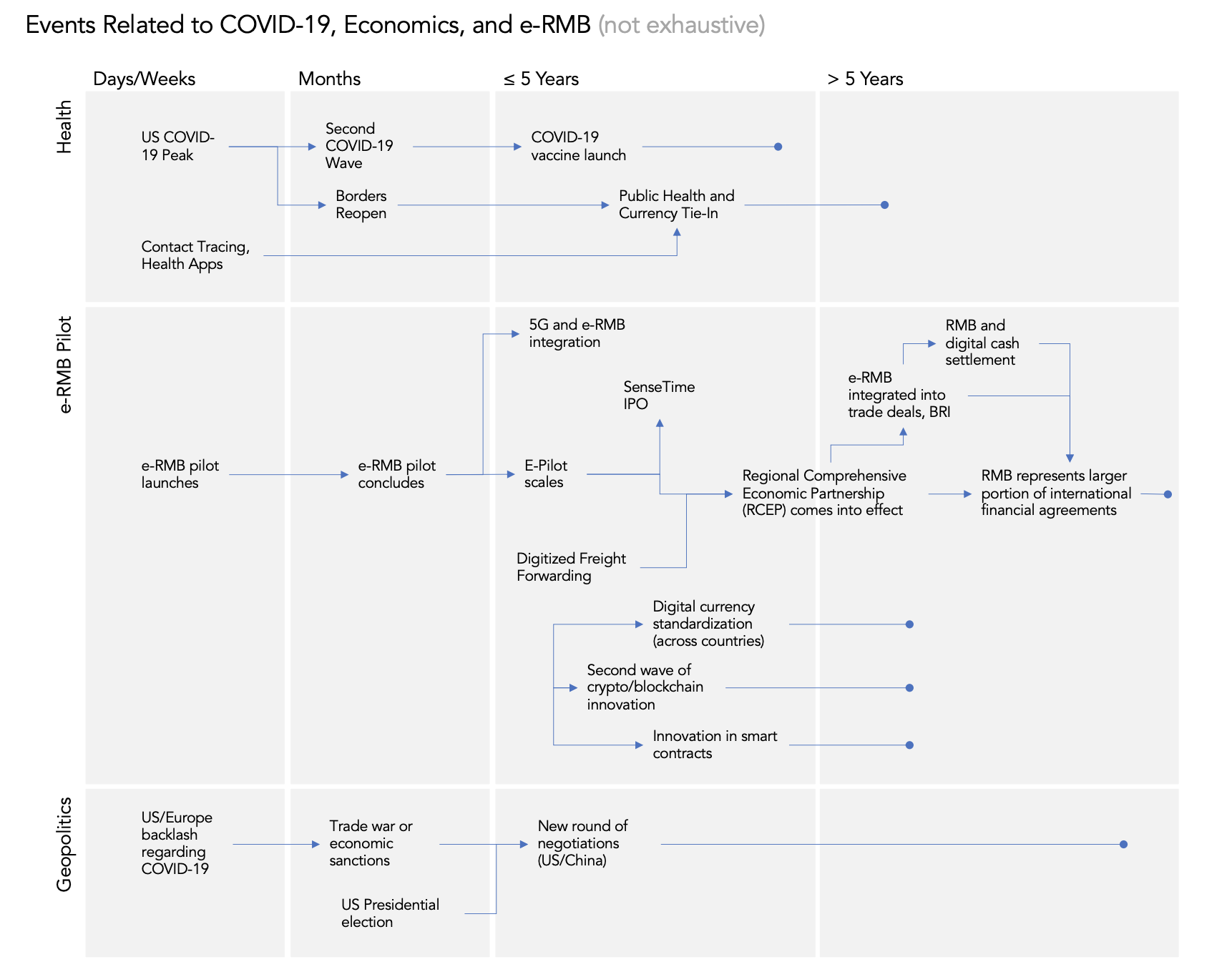The COVID-19 Economy
China's digital currency and competitive advantage during the COVID-19 economic recovery
An overlooked area in the recovery -- and one that will likely impact the world economy and geopolitics for decades to come -- is the use of digital currencies as a form of economic stimulus and recovery.
China is now piloting its digital currency in a number of cities, covering a population of about 38 million people.
Let's start with the basics.
- We're not talking Bitcoin or Ethereum. This is a state-backed, centralized currency that can be distributed to citizens via apps. It is not a distributed cryptocurrency.
- As such, it's more like a credit card that you can use like cash -- without credit or banking fees, and tied directly to the government rather than a third-party corporation.
From this perspective, how money works doesn't change.
- You still have a central bank managing the monetary supply.
- You get in-depth data collection on transactions.
- You also get a significant speed boost for issuing and transferring money to businesses, consumers, or others.
Why this relevant to COVID-19 and the economic recovery. Imagine you had a government stimulus where...
- You get your stimulus check within minutes rather than days or weeks (as happened with the IRS's management of the stimulus).
- The stimulus ensures that you spend the money on rent, food, and/or with local businesses that need to be bailed out.
- Spend is monitored in real-time. Inflation and price stability are a major risk right now. Measuring inflation during COVID-19 is difficult, unless you have a currency being tracked on a daily basis.
Economic stimulus plans work best when you they can be implemented quickly, enable data collection to understand the fast-changing situation, and provide options to create highly targeted interventions. A digital currency enables all of this.
In my March 2020 risk framework, I discuss the need to look at trends that begin taking shape in the coming weeks but last for years and decades. This is one of them.
- An economy's ability to move faster than other economies is a strategic advantage; you can distribute resources more quickly and ensure those resources get used more efficiently. This is true during COVID-19 and also during periods of normal economic activity.
- A more responsive economy means you manage the economic cycle (growth, money supply, inflation, and so on) more effectively.
- This leads to faster, more efficient use of resources -- in other words, more growth.
With all of this in mind, the Chinese digital currency pilot could be the moment where certain (i.e., digitally-enabled) economies begin diverging from physical cash-based economies… Not just in growth rate, but in speed, features, and structural capabilities.
Where does this lead 5, 10, 15 years out?
The development of a digital currency is part of a long-term strategy to diversify the global financial system. As written in the China Daily:
A sovereign digital currency provides a functional alternative to the dollar settlement system and blunts the impact of any sanctions or threats of exclusion both at a country and company level. (Source)
There are a number of systems that manage funds transfers between companies, countries, and people.
- You’re likely familiar with SWIFT for bank transfers.
- There is also the Clearing House Interbank Payments Systems (CHIPS), which oversees large financial flows -- over $1.5 trillion per day.
- These decades-old systems are criticized for being slow and inefficient.
- Imagine a new player – one pushing for the use of a new currency (e.g., the e-RMB) – were to offer a faster and more efficient option?
The above is a challenge to the dominance of the US dollar in global finance. What if this development is exacerbated with a COVID-19 backlash?
- A vocal minority is calling for China to pay reparations for COVID-19 (see a Chinese view on this and an aggressive American view on this).
- This is a terrible idea; it’ll lead to a further decoupling of Asia and the West.
- Heightened economic conflict could lead to countries shirking their debt obligations. Imagine a world where the US refuses to pay its bond obligations to China due to COVID-19. It's not impossible.
At the very least, a payment and cash settlement system that is fully digital and backed by the strength of a major state would likely influence how the global financial market works.
What I'm looking for in this pilot and subsequent effects.
The diagram below shows the major events and developments that could possibly be tied to a successful e-RMB pilot.

Click here to get a full resolution PDF.
- In the coming weeks and months…
- Does the e-RMB pilot succeed? If so, how does it scale?
- Do other countries or companies announce similar e-currency plans?
- In the coming years...
- How does the COVID-19 recovery impact the relationship between Asia and the West?
- What are the economic and policy outcomes of COVID-19, especially once the pandemic itself is behind us?
- As a proportion of global finance, do more transactions and trades take place in RMB-denominated contracts?
How will a successful e-RMB pilot, combined with a post-COVID-19 economy change the world? To paraphrase Hemingway, "Gradually and then suddenly."
You won't notice it, until it changes everything.
Sign up for our newsletter
Receive updates around stats, news, and analysis.